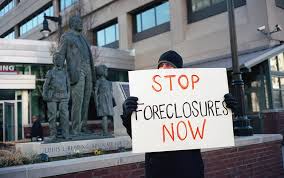Motley Fool’s 10 Reasons Not to Get Reverse Mortgage is So Wrong… but Some Right

Fox Business ran the post and made some noise, but it was first posted on The Motley Fool.com on December 28th, 2014. Written by Peter Bennett, it was titled, “10 Reasons Not to Get a Reverse Mortgage,” and it was so bad at certain points that it actually made me want to turn away from the screen out of sheer embarrassment for the author.
On the other hand, what followed some of the most shameless bias I’ve ever seen exhibited publicly in writing was some accurate and important information about reverse mortgages. Good Lord, how does this sort of thing happen?
Actually, it’s clear to me what happened here… Bennett wrote an introduction based only on his existing knowledge about reverse mortgages (Spoiler Alert: He doesn’t like them.) and then he or someone else cut and pasted a bunch of bullets in below derived from other sources, like HUD’s Website, would be my guess. And then he closes by offering the obvious alternative: Sell the home and “downsize.”
He makes it sound so simple, doesn’t he? Isn’t the answer obvious? Downsize, silly… what’s wrong with you? Downsize and live on the cash you were showered with by downsizing. Of course… why didn’t I think of that?
Umm, wait a minute… maybe because it wouldn’t work?
That so-called subject matter experts continue to feel it their responsibility to tell people how they should or shouldn’t spend their own money is beyond me? Let’s just look at what we’re really talking about here… a reverse mortgage.
A reverse mortgage is just a mortgage that offers the most flexible repayment terms imaginable. You can make interest only payments, principal and interest payments or you can decide to make no payments whatsoever for as long as you and your spouse live in the home. You continue to pay your property taxes and insurance but you can get rid of your mortgage payment during your retirement years. How can that be a bad thing?

Now, there’s certainly more than that involved and I’m not trying to oversimplify in order to gloss over anything, but what’s written just above is true. You can, in fact, get rid of your mortgage payment during retirement or pre-retirement. Generally speaking, that’s a fabulous thing to be able to do… everyone knows that.
There’s nothing insidious or untoward about a reverse mortgage, it’s a government program, regulated by HUD and insured by the FHA. It’s not an evil plot to rob retiring Americans of their home equity, and to think otherwise is madness.
(And, it is MY equity we’re talking about here, right? Okay, just checking. Continue.)
Bennett may not agree, but chances are, the only way you’re going to ever be able to retire is to not have a mortgage payment. It’s as simple as that… ask any retiree… they’ll tell you. Having a mortgage payment means someone’s still working.
And Bennett’s article does acknowledge that you need a ton of dough to retire… he says some experts peg the magic number at ten times your current annual income, while others total it up to be $2 million flat.
And I don’t care if you have twice that much saved, it’s still important to consider your home equity as a source of funds available during retirement. As a matter of fact, it’s irresponsible and shortsighted not to in most cases. Why even have a home if you can’t use it to help you retire more securely… or earlier… or at all?
Bennett’s pejorative slant is everywhere. But his facts are sketchy as well. Here’s how he introduces the reverse mortgage…
“… essentially, the lender pays you to stay in your house instead of the more traditional mortgage where you pay the lender each month to live in your home.”
Wow, if I wasn’t concerned about the harm such a description might cause, I’d say that was hysterical. A reverse mortgage is no such thing. The bank never “pays you to stay in your home”… the bank doesn’t own your home… and your children are highly unlikely to be wiped out by the presence of a reverse mortgage… at least no more than as a result of any mortgage.
A reverse mortgage is simply an equity release product… it’s a product that’s available all over the world. It simply allows a homeowner access to a portion of his or her equity after age 62.
Not only can a reverse mortgage allow you to retire, it can also prevent foreclosure should your income drop unexpectedly, or it can be used to increase personal savings by virtue of not having to make a monthly payment prior to retiring… or for any number of other great reasons.
You’re allowed to use your home’s equity in your retirement years, that’s why it’s there. The HECM is not only a very good and safe way to do so, but it’s also the only way for tens of millions of Americans who lack the income to qualify for today’s loans. And that assumes that individual can afford the payment on a loan at all.
The reverse mortgage is an ideal answer… a true lifesaver for those that use it. Personally, I can’t wait to do so.
The cost is essentially irrelevant…
The cost is essentially irrelevant because it’s not money you pay out of pocket. The costs get paid from the proceeds of the home’s sale at some point in the future, and assuming the home’s value has risen over the years, the costs will be covered by a portion of that appreciation.
Here’s an example… let’s say you took out a reverse mortgage for $200,000 when your home’s value was $400,000. Ten years later that home has gone up in value and is worth $500,000 when you sell it… and that’s when the costs of the reverse mortgage would be paid.
If the costs to get the reverse mortgage were $20,000, then you’d only get $480,000, minus whatever the sales commissions were. Big deal. Meanwhile, your out-of-pocket costs to get the reverse mortgage were zero… and you didn’t have to make a mortgage payment for that 10 years… and that saved you a whole lot more than $20,000.
Yes, you still have to pay your homeowners’ insurance and your property taxes when you have a reverse mortgage, but you still have to pay those things with ANY mortgage.
An alternative to a reverse mortgage? Well, there really isn’t one.
First, let me be clear about something: There is nothing that does what a reverse mortgage does… period. So, in terms of “an alternative,” there really isn’t one.
Of course, you could sell the home, as Bennett points out… but doesn’t everyone already know whether they can… and/or want to… sell their home or not? The whole point of a reverse mortgage is so that you don’t have to sell your home in order to retire.
Bennett also points out that you could do a “cash out refinance,” but that’s just uninformed nonsense because for one thing you probably can’t. You need income to qualify for such a loan… it’s nothing like it was back in 2006. And for another thing, the purpose of a reverse mortgage is not to have to make monthly payments and any refinance will require monthly payments… the kind that if you don’t make on time, you can end up in foreclosure.

Retiring requires two things: Lower monthly bills and monthly income from savings and Social Security. The higher your monthly bills, the higher your monthly income needs to be. It’s not rocket science, as they say.
The reverse mortgage simply allows you to free up a portion of your home equity without having to sell your home… that’s all. You can decide whether you want to make payments on the reverse mortgage or not.
Let’s say that you’re 62 and haven’t saved enough to retire, as is the case for tens of millions of Americans today. You have a mortgage balance of $300,000 with a monthly payment of $3,000 a month and 20 years of payments to go.
You don’t want to sell your home and you can make the payments… as long as you’re still working… but you’re not saving as much as you could if you didn’t have to make that $3,000 payment each month. Round numbers, the home is worth $600,000 and so you take out a reverse mortgage to pay off the $300,000 existing mortgage.
Now, instead of paying the three grand a month to the bank (which was mostly interest, by the way), you can pay $3,000 a month to yourself… that’s $36,000 a year going into your retirement savings. In ten years, when you’re 72, with the power of compound interest and some determination on your side, you could expect to have something approaching $600,000 saved up.
Meanwhile, your reverse mortgage balance would have grown to something like $465,000, give or take. So, you could now decide what you want to do about the mortgage balance… pay it off with your accumulated savings… or just keep not making monthly payments… or maybe you want to make interest only payments, so the balance stays the same.
With a reverse mortgage it’s totally up to you and you can change the amount you pay or don’t pay any time.
Maybe you want to start making monthly payments, but then summer rolls around and you want to take off and visit the grandkids… so you stop making payments over the summer… no problem. Again, it’s totally up to you.
Had you kept the traditional mortgage you had for $300,000, you very likely wouldn’t have been able to retire… or save up the extra $600k. And had you kept your traditional mortgage, you would have paid mostly interest over the ten years of making the monthly payments. Your kids would be likely to inherit more as a result of the reverse mortgage in this scenario, not less.
How in the world anyone who writes about retirement and related financial matters can possibly not see the advantages to a reverse mortgage in this and countless other situations is beyond me.
Yes, I suppose you could sell your home instead, and by all means, do that if that’s what you want to do.
Of course, if you do sell your home in order to downsize to another, you should also consider using a reverse mortgage “for purchase.” There are a few rules to follow, but basically you put 50% down and use a reverse mortgage to cover the balance. That way you don’t have to make payments if you don’t want to… or can’t.
It never hurts to remember that income is a funny thing during retirement… it has the tendency to drop unexpectedly in many instances. Having a mortgage that allows you to not make monthly payments whenever you don’t want to… or can’t… only make sense for most retirees.

Think about it this way… over the last six years, we’ve lost 2-3 million homes that were owned by people over 65, and that wouldn’t have happened had more had reverse mortgages instead of traditional loans. Of that there’s no denying.
For the most part, the only time a reverse mortgage ends up in foreclosure is when the homeowner can no longer cover the property taxes and/or insurance and if that’s the case there’s no question that they have to sell the home.
There are other rules and factors that Bennett correctly identifies, like what happens in the event you need Medicaid to cover the impossible costs of skilled nursing home care for some prolonged period? Will funds from the reverse mortgage be viewed as income by the state to which you’re applying… I have no idea, nor do I care.
(If it’s an issue with you, however, then you really need to seek counsel probably from an attorney in your state who specializes in this area of the law.)
I’m sorry to have to say it so bluntly, but personally I’m not going to do or not do anything because of the possibility of needing extended skilled nursing home care prior to the end of life.
For one thing, I don’t want to go to a nursing home in the first place, so if I’m ever in one, then it happened against my will… and trust me, I’ll be checking out soon.
And for another thing, consider my own family as it has aged. My father passed away in his chair at home somewhat abruptly… he was 82… never went anywhere near a nursing home in terms of his residence. My grandmother, had a stroke in the early 1970s and remained in a skilled nursing home or very-assisted living for the next 20-odd years.
My mother is still walking to yoga class at the community center at 84… my uncle is 88 and still driving himself to lunch meetings in D.C… my Mother’s mother went to 95, only and reluctantly living in an assisted living apartment for the last so-many months of her long life… and my wife’s parents went around 84 having spent minimal time in a nursing home.
Which one will you or I be? Who knows?
Lastly, these are state and federal benefit programs we’re talking about here. How does anyone know what their rules will or will not allow some years from now? The answer is that no one does, so I’ll do what I can to be prepared, but I’m not going to forego my financial security in anticipation of something that may not even happen. That’s just me.
Bennett is also right to say that there are strict rules that apply to a reverse mortgage and you should never sign anything you don’t fully understand, but there’s also nothing inherently dangerous about a reverse mortgage. It can, in fact, be a fantastic advantage during, or in advance of, one’s retirement years. To say otherwise is just wrong.
Much of what Bennett had to say was, in fact, correct albeit presented with a definite negative slant. For example, he points out that the younger you are, the closer you are to age 62, the lower your borrowing limit. That’s certainly true. And conversely, the older you are the higher the percentage of equity that can be accessed. Also true. That’s how the HECM reverse mortgage program works… yes.
Bennett refers to that program rule as the “Younger spouse penalty.”
So, on one hand Bennett says not to borrow from a reverse mortgage and on the other he’s saying that limits on how much you can borrow are a “penalty.” Does that mean he’d like it more if you could borrow more?
Reverse mortgages are underwritten based on age, and the older you are the more you can borrow… that’s just how the program works… it’s not a “younger spouse penalty.”
The bottom-line is that articles like Bennett’s are examples of shoddy journalism, nothing more or less, and no one should do or not do anything based on his slanted views.
Mandelman out.

